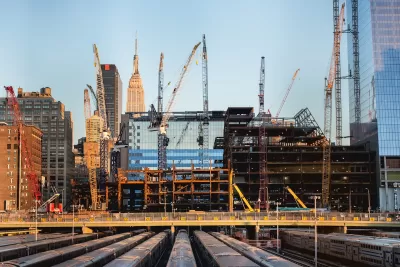Changes to tax incentives, fair housing laws, and housing assistance programs would quickly start impacting local efforts to stem the housing crisis.

In an interview with Curbed’s Kim Velsey, Matthew Murphy, executive director of New York University’s Furman Center, outlines how future federal policy could impact the housing crisis in New York City and around the country.
According to Murphy, “A lot of the housing policies we rely on today are either Republican-created or bipartisan. Housing vouchers are all about moving away from public housing and giving people choices.” Consequently, “The politics are actually in favor of not cutting Section 8.” However, Trump and Project 2025 authors have signaled the intent to tighten rules for federal housing programs to exclude households where non-citizens reside. The new administration could also cut funding to programs such as the Community Block Development Grant, which largely funds New York City’s code enforcement inspections.
For Murphy, the biggest potential impact will be changes to the tax code. “The last time they came up with opportunity zones that changed the way real estate could be invested in. There were also proposals to completely eliminate the low-income-housing-tax credit [which funds the construction and renovation of affordable rental housing].” Meanwhile, progress on fair housing could suffer if HUD stops making its resources available to enforce anti-discrimination laws.
And while a reduction in bureaucracy could be a good thing, Trump doesn’t appear poised to follow a small-government model. “It’s not like he’s embracing a libertarian vision of zoning, which is basically that we should abolish it and embrace market-based solutions,” Murphy says.
FULL STORY: ‘New York City Will Have to Defend a Lot of Programs We Rely On’

Alabama: Trump Terminates Settlements for Black Communities Harmed By Raw Sewage
Trump deemed the landmark civil rights agreement “illegal DEI and environmental justice policy.”

Planetizen Federal Action Tracker
A weekly monitor of how Trump’s orders and actions are impacting planners and planning in America.

The 120 Year Old Tiny Home Villages That Sheltered San Francisco’s Earthquake Refugees
More than a century ago, San Francisco mobilized to house thousands of residents displaced by the 1906 earthquake. Could their strategy offer a model for the present?

LA’s Tree Emergency Goes Beyond Vandalism
After a vandal destroyed dozens of downtown LA trees, Mayor Karen Bass vowed to replace them. Days later, she slashed the city’s tree budget.

Sacramento Leads Nation With Bus-Mounted Bike Lane Enforcement Cameras
The city is the first to use its bus-mounted traffic enforcement system to cite drivers who park or drive in bike lanes.

Seattle Voters Approve Social Housing Referendum
Voters approved a corporate tax to fund the city’s housing authority despite an opposition campaign funded by Amazon and Microsoft.
Urban Design for Planners 1: Software Tools
This six-course series explores essential urban design concepts using open source software and equips planners with the tools they need to participate fully in the urban design process.
Planning for Universal Design
Learn the tools for implementing Universal Design in planning regulations.
Ada County Highway District
Clanton & Associates, Inc.
Jessamine County Fiscal Court
Institute for Housing and Urban Development Studies (IHS)
City of Grandview
Harvard GSD Executive Education
Toledo-Lucas County Plan Commissions
Salt Lake City
NYU Wagner Graduate School of Public Service





























